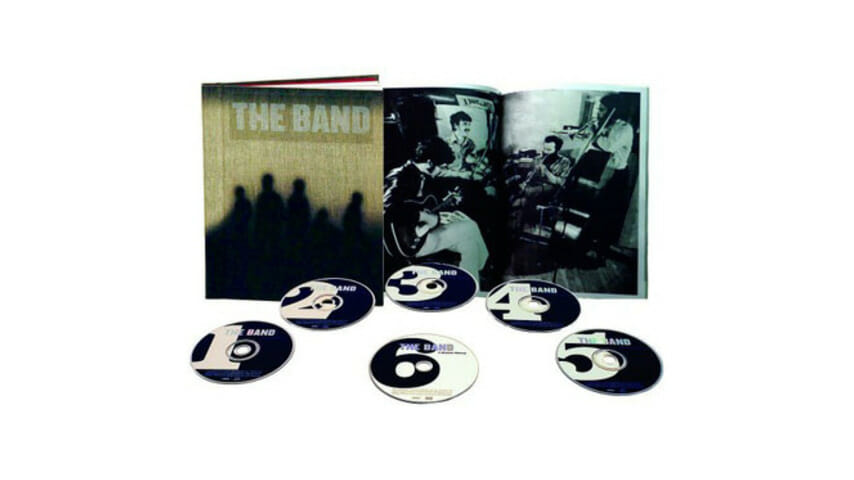
The Anthology: Unreleased material makes otherwise redundant box worth the Benjamin
The enduring fascination The Band provokes in fans the world over has enabled Capitol’s catalog division to release no less than eight compilations over the years, including two multi-CD retrospectives, most recently 1994’s three-CD anthology, Across the Great Divide, which itself supplanted the 1989 self-described “definitive collection,” To Kingdom Come. Having beautifully restored and re-issued all of The Band’s output from 1968 to 1976, Capitol now “concludes” the project with a five-CD, one-DVD box set put together under the supervision of Band guitarist Robbie Robertson. With the group’s oeuvre already so heavily anthologized, the appeal of yet another box set, not to mention one that will set you back the better part of $100, hinges solely on the strength of its 37 previously unreleased tracks and filmed performances. Fortunately the new material is solid enough to anchor a volume that can now rightly (and, let’s hope, finally) be called definitive. Fans who don’t already own Across the Great Divide will find it difficult to pass this bounty up. Those who do own it will have to think long and hard about the purchase, but the quality of the unreleased material might be enough to tip the scale, even for cynics rightly wary of Capitol’s motives.
The first CD chronicles the group’s sojourn as backup band for rockabilly latecomer Ronnie Hawkins, through the beginnings of its groundbreaking collaboration with Bob Dylan. The Hawkins material has long been available elsewhere, but in context it provides a fascinating look at the development and musical education of an ensemble working its way toward unprecedented musical alchemy. The first real gems of the unreleased material are “Bacon Fat” and “Honky Tonk,” recorded as Levon and The Hawks. “Honky Tonk” showcases Richard Manuel’s voice in one of his most aggressive performances. “Bacon Fat” shows The Band already blurring aesthetic boundaries, tracing a long grease mark on the musical map between Memphis and Chicago. A 55-second clip of bassist Rick Danko and Manuel singing “Will the Circle be Unbroken” rounds out the disc with a verse and chorus that sounds like a setup for the most achingly gorgeous gospel rave-up since The Reconstruction; but it ends abruptly just as the song begins to build. Your frustration will be palpable.
The second CD includes tracks from the mythic Basement Tapes and the entire contents of Music from Big Pink. The unreleased material is lighter here, but contains another fantastic Manuel vocal performance on “Baby Lou,” a slinky, MG’s-redolent strut that ranks as one of the ?nest pocket grooves drummer Levon Helm and bassist Rick Danko ever conjured. Others are simply alternate or extended versions of previously released tracks like “To Kingdom Come” and “Yazoo Street Scandal.” Disc three focuses on the period surrounding the recording of The Band, and includes previously unheard live tracks from a 1971 performance at Royal Albert Hall, all of which rival Rock of Ages for energy if not sound quality.
The fourth and fifth discs, spanning the Northern Lights/Islands period, contain some of the best new material on the collection, including a fierce live version of “Highway 61 Revisited,” recorded with Dylan in 1974. The best discovery here is “Two Piano Song,” which features Danko on bowed double bass and celli, while Robertson and organist Garth Hudson both take a seat at the ivories. A simple romantic theme builds around a smart arrangement showcasing the ensemble’s near-infallible chemistry.
The DVD is a slim, desultory assemblage of previously unseen video that opens with a brilliant, note-perfect 1970 performance of “King Harvest” shot at Robertson’s studio in Woodstock. Also worthwhile is The Band’s 1977 appearance on Saturday Night Live, with renditions of “Life is a Carnival,” “Stage Fright” and “Georgia on My Mind.” Other tracks, however historically interesting, are either poorly shot (as in Danko’s performance of “Long Black Veil” during the Festival Express Tour), or poorly performed (like the 1974 Wembley Stadium footage of “Chest Fever” that might best have remained in Capitol’s vaults. At 45 minutes, the DVD is easily the least substantial disc in the box. Liner notes by longtime Band companion and musicologist Rob Bowman begin with the revelatory declaration, “The late 1960s were an incredibly fertile time in popular music history.” What follows are 108 pages of similarly pat but informative prose that all but the most dedicated will find hard to finish.
With virtually any other act, A Musical History would probably come off as pure catalog-mining by Capitol. Which, of course, is exactly what it is. But The Band is the Citizen Kane of rock—utterly immune to hype or oversell. Its music’s ability to overcome the kind of self-mythologizing and pretense that’s dimmed many a band’s reputation (U2’s Rattle and Hum comes to mind) is as mysterious and unlikely as the synthesis of traditional and modern sounds characterizing the group’s achievement. There’s an almost spiritual purity to the music that retains its potency even in the most overblown and self-indulgent settings (The Last Waltz comes to mind). Perhaps Helm had it right when he remarked in an interview a few years back: “Everybody’s intentions seemed to be right on … everything just felt righteous.”